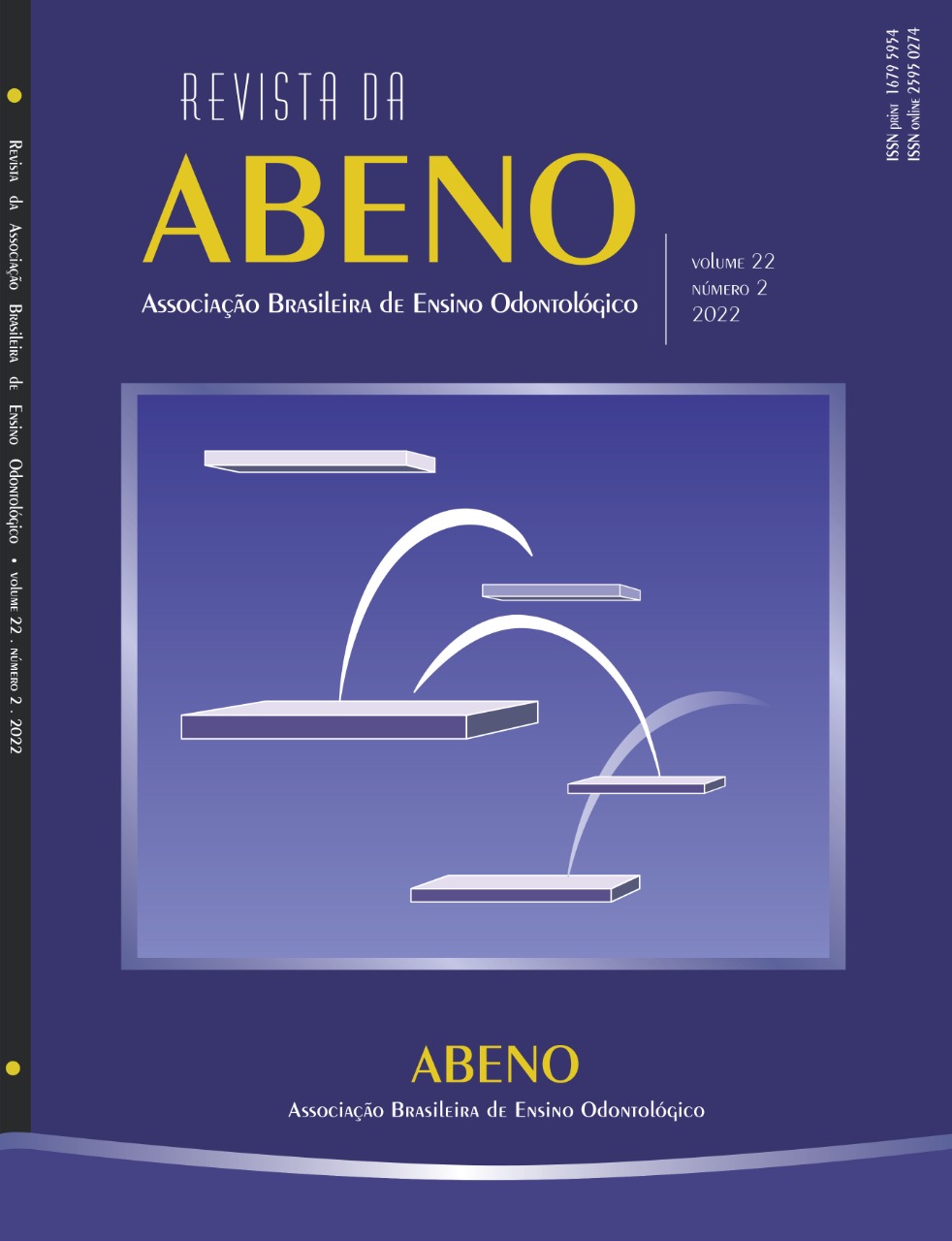A pandemia e a reformulação de um projeto de extensão sobre educação em saúde bucal
relato de um ano de experiência com mídias sociais
DOI:
https://doi.org/10.30979/revabeno.v22i2.1695Palavras-chave:
Educação em Saúde Bucal, Ciências da Saúde, Odontologia Preventiva, COVID-19Resumo
O objetivo deste artigo é relatar a experiência de um ano, do projeto de extensão Sorriso Saudável Futuro Brilhante, do Departamento de Odontologia da Universidade Estadual de Maringá, cujas atividades, antes puramente presenciais, em decorrência da pandemia, foram adaptadas à forma remota. Para evitar a interrupção das atividades de educação e promoção de saúde junto à comunidade e também manter os participantes motivados, foram utilizados os meios eletrônicos. A equipe, composta por 16 acadêmicos coordenados por um docente, dividiu-se em 4 grupos (G1: produção de material digital informativo; G2: arrecadação e repasse de doações para ações externas; G3: gerenciamento da rede social e divulgação das atividades; G4: produção de conteúdo científico). As ações e o conteúdo eram publicados na página do Instagram. Também foram organizados dois eventos dirigidos à comunidade odontológica. A comunicação professor/aluno ficou mais fácil com a criação do grupo de WhatsApp, e o perfil no Instagram alcançou mais de 900 seguidores em um ano, rompendo fronteiras para a divulgação dos conteúdos. Os eventos foram realizados de forma gratuita, online, com palestrantes nacionais e internacionais e participantes de diversos estados brasileiros, obtendo forte repercussão no âmbito acadêmico. Conclui-se que, embora as atividades remotas não substituam as presenciais, o novo formato do projeto se mostrou inovador, dinâmico e proveitoso para todos os envolvidos, além de apresentar baixo custo e grande potencial de abrangência, podendo funcionar de forma independente ou ainda somar-se às atividades presenciais do projeto, em ações futuras, quando a pandemia chegar ao fim.
Downloads
Referências
Velavan TP, Meyer CG. The COVID-19 epidemic. Trop Med Int Health. 2020; 25(3):278-80.
Camilloni, ARW. La integración de la participación de los estudiantes en proyectos de extensión como componente del currículo universitario. InterCambios. 2020;7(1):13-29
Freire P. Extensão ou comunicação? 5. ed. Rio de Janeiro: Paz e Terra, 1980. 44p.
Mheidly N, Fares J. Leveraging media and health communication strategies to overcome the COVID-19 infodemic. J Public Health Policy. 2020; 41(4):410-20.
Santana VV, Santos PR, Leal AKTBN, Silva DBS, Pereira EV, Silveira LNS et al. A importância do uso da internet sob o viés da promoção interativa na educação em tempos de pandemia. Braz J Dev. 2020; 6(10):78866-76.
Chen J, Wang Y. Social media use for health purposes: systematic review. J Med Internet Res. 2021; 23(5):e17917.
Nunes RKS, Maciel GAS, Almeida EB, Guedes MR, Henn R. Desafios e adaptações da extensão universitária em tempos de pandemia: relato de experiência. Rev Ciênc Plural. 2021;7(1):211-23.
Curitiba (Paraná). Decreto 4258 Art 5°, de 17 de março de 2020. Altera o art. 8º, do Decreto nº 4.230, de 2020. Diário Oficial nº. 10647 [Internet]. 2020 [Acesso em 23 jun. 2021]. Disponível em: https://www.legislacao.pr.gov.br/legislacao/ pesquisarAto.do?action=exibir&codAto=23 2889&codTipoAto=&tipoVisualizacao=original.
Maringá (Paraná). Resolução n° 004/2020- CEP, de 07 de maio de 2020 [Acesso em 23 jun. 2021]. Disponível em: http://www.scs.uem.br/2020/cep/004cep2020.htm.
Juliani DP, Juliani JP, Souza JA, Bettio RW. Utilização das redes sociais na educação: guia para o uso do Facebook em uma instituição de ensino superior. Renote. 2012;10(3):36434.
Montandon FM, Loivos LG, Siqueira CS, Martins MMM, Feitosa JL, Holanda DM et al. O Instagram® como ferramenta de educação e multiplicação do conhecimento em saúde bucal. Rev ComCenso. 2020; 7(4): 185-9.
Moita FMGSC, Andrade, FCB. Ensinopesquisa-extensão: um exercício de indissociabilidade na pós-graduação. Rev Bras Educ. 2009;14(41):269-80.
Rocha CR, Moreira APA, Silva LR, Santos IMM, Barbosa MN, Bittencourt G, et al. A utilização das redes sociais como estratégia para continuidade da extensão universitária em tempos de pandemia. Ra e Rum. 2020;8(1):261-9.
Downloads
Publicado
Como Citar
Edição
Seção
Licença

Este trabalho está licenciado sob uma licença Creative Commons Attribution-NonCommercial 4.0 International License.
Autores que publicam nesta revista concordam com os seguintes termos:
a) Autores mantém os direitos autorais e concedem à revista o direito de primeira publicação, com o trabalho simultaneamente licenciado sob a Licença Creative Commons Attribution que permite o compartilhamento do trabalho com reconhecimento da autoria e publicação inicial nesta revista.
b) Autores têm autorização para assumir contratos adicionais separadamente, para distribuição não-exclusiva da versão do trabalho publicada nesta revista (ex.: publicar em repositório institucional ou como capítulo de livro), com reconhecimento de autoria e publicação inicial nesta revista.
c) Autores têm permissão e são estimulados a publicar e distribuir seu trabalho online (ex.: em repositórios institucionais ou na sua página pessoal) a qualquer ponto antes ou durante o processo editorial, já que isso pode gerar alterações produtivas, bem como aumentar o impacto e a citação do trabalho publicado (Veja O Efeito do Acesso Livre).






